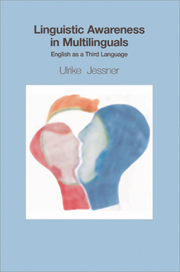Book contents
- Frontmatter
- Contents
- List of figures and tables
- List of abbreviations
- Acknowledgements
- Introductory remarks
- 1 Multilingualism with English
- 2 Learning and using a third language
- 3 On the nature of linguistic awareness
- 4 Exploring linguistic awareness in third language use
- 5 Crystallizing linguistic awareness in multilingual education
- 6 Envoi
- References
- Index
Introductory remarks
Published online by Cambridge University Press: 05 September 2013
- Frontmatter
- Contents
- List of figures and tables
- List of abbreviations
- Acknowledgements
- Introductory remarks
- 1 Multilingualism with English
- 2 Learning and using a third language
- 3 On the nature of linguistic awareness
- 4 Exploring linguistic awareness in third language use
- 5 Crystallizing linguistic awareness in multilingual education
- 6 Envoi
- References
- Index
Summary
‘Wer fremde Sprachen nicht kennt, weiβ nichts von seiner eigenen.’
Goethe (Maximen und Reflexionen)‘If you do not know any foreign languages, you do not know anything about your own.’
(Translation by the author)This is a rather well-known quotation by Goethe, who used it about two hundred years ago when contact with other languages or knowing other languages was not a common experience for the majority of the population in many parts of the world. Nowadays, due to increased mobility and globalization, the use of more than two languages has become a normal part of daily life for most human beings. This fact has increased scholarly interest in the phenomenon of multilingualism. From the discussion in this book it will become clear that Goethe's assumption presents a very valid reflection on metalinguistic knowledge and the awareness of that knowledge in multilinguals.
With multilingualism growing in our society, research concerning the cognitive aspects of multilingual proficiency has increased over recent years. The assumption that bilinguals are better language learners than monolinguals has been discussed in studies on the linguistic and cognitive effects of bilingualism on third language learning. This area of research has recently started to emerge by pointing out that third language acquisition differs from second language acquisition in various respects. The cognitive advantages of bi- and multilinguals over monolinguals are often related to an increased level of metalinguistic awareness, which is assigned a crucial role in holistic approaches to multilingualism (e.g. Cook 1991; Grosjean 1985; Herdina and Jessner 2002).
- Type
- Chapter
- Information
- Linguistic Awareness in MultilingualsEnglish as a Third Language, pp. xi - xivPublisher: Edinburgh University PressPrint publication year: 2006



